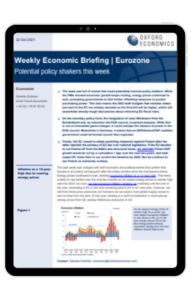Eurozone weekly economic briefing | Potential policy shakers this week

The week was full of events that could potentially become policy shakers. While the PMIs showed economic growth keeps cooling, energy prices continued to soar, prompting governments to find further offsetting measures to protect purchasing power.
What you will learn:
- On the monetary policy front, the resignation of Jens Wiedmann from the Bundesbank and, by extension the ECB council, surprised analysts. While this is not an immediate game-changer, it could reshape the balance of power in the ECB council.
- Meanwhile in Germany, it seems that an SPD/Greens/FDP coalition government could be formed sooner than expected.
- The EU vowed to adopt punishing measures against Poland after the
latter rejected the primacy of EU law over national legislation.
{% video_player “embed_player” overrideable=False, type=’scriptV4′, hide_playlist=True, viral_sharing=False, embed_button=False, autoplay=False, hidden_controls=False, loop=False, muted=False, full_width=False, width=’1920′, height=’1080′, player_id=’58287842917′, style=” %}
Tags:
Related Services

Post
House prices continue to slide for China’s cities
Research Briefing Eurozone weekly economic briefing | Potential policy shakers this week While the property market downturn has been universal, the scale and depth has been varied for different cities and regions.
Find Out More
Post
The Construction Productivity Challenge in Australia
Delve into the state of construction productivity in Australia. Understand the factors affecting growth and how innovation can transform the industry for the better.
Find Out More